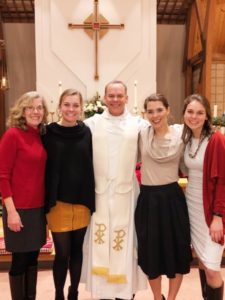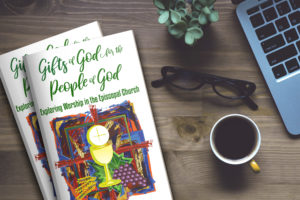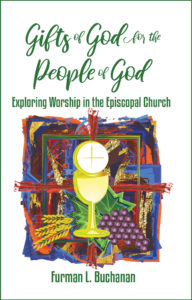 In his new book, Gifts of God for the People of God, Episcopal priest and author Furman L. Buchanan uses stories and reflections to explore each element of Holy Eucharist. Accessible to both newcomers and longtime members wishing to gain a deeper understanding of this gift of God.
In his new book, Gifts of God for the People of God, Episcopal priest and author Furman L. Buchanan uses stories and reflections to explore each element of Holy Eucharist. Accessible to both newcomers and longtime members wishing to gain a deeper understanding of this gift of God.
How did the idea for the book Gifts of God for the People of God develop?
The idea for Gifts of God for the People of God came when I recognized similarly bewildered expressions on the faces of visitors to my congregation that I had when first entering the Episcopal Church years ago. For people unfamiliar with liturgical worship, it can be a confusing experience.
I began writing this book to lead newcomers to liturgical worship step-by-step through the whole service—from the opening sentences to the final dismissal. Yet, in the course of writing it, I recognized an opportunity to use a narrative approach which would make this book just as meaningful for “cradle Episcopalians.”
Using personal as well as biblical stories helps readers relate more personally to the words and actions of the Holy Eucharist. The title sums up the central idea of the book—that the gifts of God are for the people of God to open up, treasure, and share with others.
 What was your favorite part of writing this book?
What was your favorite part of writing this book?
My favorite part of writing Gifts of God for the People of God was the opportunity to be still and remember some very tender (and also funny) stories from all stages of my life, and then find ways to relate those stories to the words and actions of the Holy Eucharist.
I enjoy making narrative connections that are not always obvious at first. Part of the power of story—from Jesus’ parables to our present day stories—is bringing together ideas in ways that are meaningful and memorable.
What was the most challenging part?
The most challenging part of writing Gifts of God for the People of God was the patience and perseverance it required. I am a writer who is most lucid in the morning hours. However, as the rector of a growing congregation, most of my morning hours are devoted to other important and urgent work. As a result, this book became a labor of love that spanned years, not weeks or months.
What would you do if you felt stuck?
When I felt stuck I would call upon my dear friend who is a Presbyterian pastor and a published author. We would meet for coffee to discuss my latest challenge. He was the kind of person every writer needs—a confessor who is tough enough to push us when we get stuck and yet gentle and encouraging enough to fan the flame inside of us that wants to share a meaningful story with the world.
How do you see this book being utilized?
Recognizing how difficult it is to find time to sit and read, I decided to compose short and accessible chapters—portion sizes that are easily digestible for a bedside table-type book. In fact, I believe this book will be most profitable for readers who are willing take it slow and savor the gifts of God they have experienced in their own lives.
Each chapter concludes with two simple invitations: “Reflecting on our story with God” and then “Celebrating our story with God.” The first invitation includes two or three questions to ponder, and the second invitation includes two or three suggested practices a reader might engage as a way of celebrating the gifts and call of God in their life.
By organizing this book with reflection questions and activities, I believe we also have designed a resource that lends itself to being used in small groups and classes. There is an easy-to-follow, 6-week outline on the Forward Movement web site to show potential facilitators a way to organize conversation about Gifts of God for the People of God.
 Where did you do most of your writing?
Where did you do most of your writing?
Ten years ago, a gifted artist and woodworker in my former congregation invited me to apprentice with him in designing and creating a prayer desk from solid cherry. Sensing I was nearing the end of my first call, he wanted me to have a gifted place to pray and write at my next congregation.
This small, shaker-style desk does not have a single piece of metallic hardware. The construction is elegantly simple. The desk fits perfectly beneath my bedroom window, and it turns out to be the only place I seem able to write a sermon or a book.
 What would you do or where would you go for inspiration?
What would you do or where would you go for inspiration?
One of the passions my wife and I share is travel. We particularly like to research and visit places that require a little more persistence and creativity to navigate. We typically stay in small guest houses and eat at local restaurants where we can attempt to know the local population a little better.
Near the end of my writing Gifts of God for the People of God, we visited two of the Galapagos Islands off the Pacific Coast of Ecuador. This was a particularly inspirational journey as we discovered a miraculous abundance and diversity of topography, as well as bird, reptile, mammal, and marine life.
One afternoon we visited a small farm in the central highlands of Santa Cruz that is also home to enormous tortoises. Here is a picture of us next to the symbol of my slow and steady writing life!
What else would you like readers to know?
I suppose the most important thing I want readers to know is that the biblical story of life with God is continually unfolding around us and within us. We don’t have to literally have our narrative added to the original collection of Holy Scripture in order for it to be authentic and meaningful.
Your story with God is every bit as precious as the stories of those who lived with God when the biblical narrative was being written. So, please value your stories and share them with others.
Newcomers to my congregation receive a welcome letter in which I describe our congregation as a place where we celebrate the gifts of God in worship, discover the gifts of God in learning, and share the gifts of God in service.
For me, this sums up the comprehensive experience of a faithful life—celebrating, discovering, and sharing the Gifts of God for the People of God!




